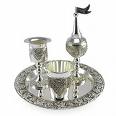

If you haven't done so yet today, please recite the
Blessings over the Torah
before reading the Torah on this web site.
When Shabbos ends, about 60 minutes after sunset (depending on your location and the Customs of your congregation), we say "Boruch Hamavdil bain kodesh lichol."
This means "Blessed is He Who separates between the holy and the mundane."
Now that the Sabbath has ended, this allows us to do some basic things that are forbidden on the Sabbath, like light the candle for Havdalah. When you pray the nighttime prayers, there is a special prayer called "Attah chonantanu," which accomplishes the same thing. So you need say this only if you have not yet said the Attah Chonantanu prayer.
Now that we have made this declaration (or the prayer), we may prepare to say Havdalah.
You will need the following things:


It doesn't have to look like either of those. It doesn't have to be silver either. It doesn't even have to be fancy in any way. Those are just samples, so you get the idea of what we're talking about.
Goblet: The goblet should preferably be not a disposable cup. This shows that you hold the ceremony in some esteem. Most people use either silver or silver plate. Pewter is nice too, but sometimes the insides turn green from use. A glass cup is also acceptable.
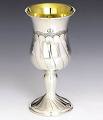
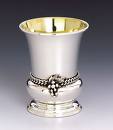
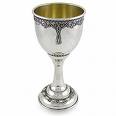
Wine: Anyone who would get ill from drinking wine or grape juice may use something else. However, there is a list of precedence for what is preferable. Since using wine is to show that the ceremony is a prestigious one, we would use something else only when necessary, and certain things show more prestige than others. So wine is the most preferable, and then comes grape juice. Coffee or tea is preferred by many who cannot drink wine or grape juice. Many diabetics use tea, and many people with stomach problems (especially after Shabbos) use coffee. Some people can use raisin wine. (Ask your doctor.) If necessary, it is also permitted to use orange juice or apple juice. There may be other possibilities, so if none of these work for you, ask your Rabbi.) Water may never be used.
Spices: The reason for this is that on Shabbos we are each granted additional spiritual essences. When Shabbos ends, they leave us, and return only the next Shabbos. Our souls feel the loss (even if sometimes we don't), and smelling aromatic spices brings cheer and comfort to the soul. It is taught in the Sefer Ben Ish Chai that smell is a more spiritual sense than most of the other senses, and in the World of Souls that is one of the spiritual benefits granted the souls there.
We keep the spice box closed so that we don't smell the fragrance until after we have made the blessing on the spices. You don't actually need a specific type of spice box for the spices, and they come in various styles. or you can simply keep them in the jar they come in. But here are some popular styles:
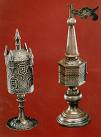

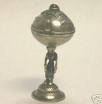

We may not use artificially created aromas. Most people use cloves, but we may also use cinnamon, or a fresh myrtle branch, or musk, and other natural fragrant sources.
Candle: The reason we light this and say a blessing on it is because Motza Shabbos (Saturday night) was the first time that Adam and Eve ever made fire. Hashem gave this as a gift to Adam and Eve on the first Motza Shabbos after Creation, so that they would not be in the dark. Now that they were exiled from Eden, they needed light and warmth at night.
If you don't have a proper Havdalah candle, you may hold two candles together so that the flames join. The point is that preferably there should be more than one flame in the fire. Thus, we say on this light the blessing "Who creates the lights of the fire" (lights, in plural). If you can't get two candles, you may also use one, and still fulfill the obligation, if that's your only choice. Good Judaica stores sell Havdalah candles.
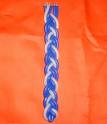
(It doesn't have to be blue and white, or any particular color.)
The first thing we do is fill the goblet with the wine or wine substitute. It is the Custom among many to overpour, spilling a little bit over the sides of the goblet. This shows that you are blessed, that you have wine in abundance in your home. also, you will use this later to extinguish the flames of the Havdalah candle.
We then loosen the cover to the smelling-spices so we can get to them easily when we need to.
Next, we light the Havdalah candle. Get someone to hold the candle while you say Havdalah. You can also buy Havdalah-candle holders that prevent the candle from falling on the table and starting a fire. Good ones will also prevent the wax from dripping down on your hands.
It is permitted to prepare the items in a different order. This is just the logical sequence, and also the order in which we must say the Blessings.
Next we recite Havdalah.
After Havdalah is over, we drink the wine, and then we extinguish the candle. Many people have the custom to extinguish the candle by dousing it with the leftover wine from the goblet (not from the wine bottle). You hold the flames in the wine that's in the plate, and pour the leftover wine over it.
Then we recite the after-blessings over the wine.
That is Havdalah, in brief. If you get the chance, try to experience it at the home of observant Orthodox Jews. Judaism needs to be experienced in person; books and classes, though absolutely necessary, are not enough for someone to learn Judaism. See my wife's article "The Kindness of Strangers," and find a place to stay for Shabbos.
[Back to the Shabbat Gateway] [Being Jewish Home Page] | [Questions/Comments?]